Discover The AI in Business Podcast
The AI in Business Podcast

The AI in Business Podcast
Author: Daniel Faggella
Subscribed: 12,806Played: 223,389Subscribe
Share
© Daniel Faggella, 2014
Description
The AI in Business Podcast is for non-technical business leaders who need to find AI opportunities, align AI capabilities with strategy, and deliver ROI.
Each week, Emerj research staff and journalists interview top AI executives from Fortune 2000 firms and unicorn startups - uncovering trends, use-cases, and best practices for practical AI adoption.
Visit our advertising page to learn more about reaching our executive audience of Fortune 2000 AI adopters: https://emerj.com/advertise
Each week, Emerj research staff and journalists interview top AI executives from Fortune 2000 firms and unicorn startups - uncovering trends, use-cases, and best practices for practical AI adoption.
Visit our advertising page to learn more about reaching our executive audience of Fortune 2000 AI adopters: https://emerj.com/advertise
1042 Episodes
Reverse
Today's guest is Trish Vassar, Vice President of Global Learning & Development, who brings over 20 years of experience in talent management, learning, and leadership development. She joins Emerj Editorial Director Matthew DeMello to explore how enterprise leaders can shift from traditional role-based planning to skills-based workforce strategies powered by AI. The conversation also covers practical approaches to AI-assisted workflows, establishing a shared skills language, and improving staffing and training outcomes across the organization. This episode is sponsored by Workera. Learn how brands work with Emerj and other Emerj Media options at emerj.com/ad1. Want to share your AI adoption story with executive peers? Click emerj.com/expert2 for more information and to be a potential future guest on the 'AI in Business' podcast!
Today's guest is Julian Tang, Chief Operations Officer for the Innovation Office at BlackRock. With extensive experience in financial technology and infrastructure, Julian specializes in integrating AI and data strategies to transform enterprise workflows. Julian joins Emerj Editorial Director Matthew DeMello to explore how leading organizations are scaling AI effectively by building resilient data environments, establishing transparent governance frameworks, and fostering a culture of trust and responsible innovation. Julian also shares practical strategies for reducing operational friction, implementing modular AI workflows, and maximizing ROI across enterprise AI initiatives. Join us for an insightful discussion on the future of data-driven AI in business. Share your AI adoption story and be considered as a future guest on the 'AI in Business' podcast. Apply now at emerj.com/expert2. This episode is sponsored by Pure Storage. See how your brand can share insights and reach decision-makers through Emerj.
Today's guest is Raul Monroig, People Organization Vice President for the Intercon Region at Bristol Myers Squibb. Bristol Myers Squibb manufactures prescription medicines across oncology, hematology, immunology, cardiovascular disease, and neuroscience. With a truly global footprint, the company's research, manufacturing, and commercial presence spans more than 60 countries, and with such scale, of course, comes the complexity of managing a vast workforce. Raul joins Emerj Editorial Director Matthew DeMello to discuss how global HR teams can embrace AI to tackle critical challenges in workforce development. With AI adoption accelerating at breakneck speed, it may be that focusing on a small set of essential skills like curiosity, agility, and customer service orientation — rather than training employees on everything all at once — may be the paradigm shift that helps drive organisational success. Learn how brands work with Emerj and other Emerj Media options at emerj.com/ad1.
Today's guest is Taylor Sullivan, Head of Product and Assessments at Workera. Workera provides AI-driven skills verification and assessment solutions for organizations. Taylor joins Emerj Editorial Director Matthew DeMello to discuss how organizations can move from skill inferencing to verified, measurable skills, enabling more confident talent decisions. Taylor also explains how AI-powered assessments can personalize learning, reduce time to proficiency, and provide leaders with actionable data to align workforce capabilities with evolving business needs. This episode is sponsored by Workera. Learn how brands are driving impact in enterprise AI through Emerj's media offerings. Find out more at emerj.com/ad. Emerj features the voices driving enterprise AI adoption. If your insights move strategy forward, share them with executive peers on the AI in Business podcast. Apply at emerj.com/expert2.
Today's guest is Sachit Kamat, Chief Product Officer at Eightfold AI. Eightfold AI provides a complete AI platform for talent management to help companies find, recruit, and retain workers with the goal of increasing the efficiency and effectiveness of talent operations. Sachit joins Emerj Editorial Director Matthew DeMello to discuss how agentic AI enables HR teams to move from human-scale to machine-scale processes, rethinking how organizations identify, assess, and mobilize talent. The conversation also covers how agentic systems can enhance compliance, accelerate change management, and create measurable ROI by automating interview workflows and optimizing internal mobility. This episode is sponsored by Eightfold AI. Want to share your AI adoption story with executive peers? Click emerj.com/expert2 for more information and to be a potential future guest on the 'AI in Business' podcast!
Today's guest is Greg Ratcliff, Chief Innovation Officer at Vertiv. With 30 years of experience leading technology teams and global innovation initiatives, Gregory offers deep expertise in data, IoT, and digital infrastructure. Ratcliff joins Emerj Editorial Director Matthew DeMello to discuss how enterprise leaders can scale AI effectively by building the right infrastructure and addressing key bottlenecks. Gregory also shares practical strategies for modular, hybrid data environments, bridging talent gaps, and improving operational efficiency across AI workflows. Join an exclusive circle of AI leaders shaping the conversation in business. Share your AI adoption story and be considered as a future guest on the 'AI in Business' podcast. Apply now at emerj.com/expert2.This episode is sponsored by Pure Storage. See how your brand can partner with Emerj to share insights and reach decision-makers. Get started at emerj.com/ad1.
Today's guest is Jim Johnson, President at AnswerRocket. Founded in 2013, AnswerRocket builds enterprise AI agents delivering measurable outcomes for Fortune 2000 clients across consumer goods, financial services, construction, real estate, and beyond. Johnson joins Emerj Editorial Director Matthew DeMello to discuss how consumer packaged goods companies can overcome data complexity and accelerate decision-making with emerging agentic AI capabilities. The conversation also examines how CPG teams can shorten analysis cycles, reduce dependence on manual reporting, and uncover new revenue opportunities by pairing existing human expertise with continuously learning AI agents. This episode is sponsored by AnswerRocket. Interested in putting your AI product in front of household names in the Fortune 500? Connect directly with enterprise leaders at market-leading companies. Emerj can position your brand where enterprise decision-makers turn for insight, research, and guidance. Visit emerj.com/sponsor.
Today's guests are Matt Berseth, Co-founder and CIO at NLP Logix, and Russell Dixon, Strategic Advisor at NLP Logix. NLP Logix is a fast-growing AI services firm based in Florida that serves both the public and private sectors. Berseth and Dixon join Emerj Editorial Director Matthew DeMello to discuss how enterprise leaders can successfully deploy AI collaboration tools like ChatGPT Enterprise and Microsoft Copilot, set the right foundations for adoption, and measure ROI. They also share practical takeaways on identifying high-value use cases, tracking meaningful usage and productivity metrics, creating feedback loops to share best practices, and embedding AI tools into workflows to deliver sustained business impact. This episode is sponsored by NLP Logix. Learn how brands work with Emerj and other Emerj Media options at emerj.com/ad1. Want to share your AI adoption story with executive peers? Click emerj.com/expert2 for more information and to be a potential future guest on the 'AI in Business' podcast!
Today's guest is Emily Nguyen, Head of Industrials and Warp Speed at Palantir Technologies. Emily joins Emerj Editorial Director Matthew DeMello on the show to discuss the realities of AI adoption on the factory floor. Despite rapid advances in AI, many manufacturers still rely on legacy systems, siloed data, and even pen-and-paper processes. Emily shares insights from her 12 years at Palantir on how to bridge these gaps, connect critical functions, and build organizational readiness for AI. Want to share your AI adoption story with executive peers? Click emerj.com/expert2 for more information and to be a potential future guest on the 'AI in Business' podcast!
Today's guest is Dag Liodden, Chief Product Officer and Co-founder at Crisp. Crisp combines the power of agentic AI with deep retail expertise. Over 7,000 brands leverage Crisp to manage and enrich their retail data to surface valuable insights and drive sales and supply chain performance. Dag joins Emerj Editorial Director Matthew DeMello to discuss why vertical expertise in CPG is essential for unlocking AI's potential, and how creating an AI-ready foundation through data harmonization transforms workflows – from category and promotion management to supply chain optimization. He also explains how this foundation allows teams to focus on strategic work, while AI-powered agents improve real-time performance, reduce human error, and drive measurable ROI across product portfolios. This episode is sponsored by Crisp. Discover how leading brands partner with Emerj to grow their profile and drive impact. Explore partnership opportunities at emerj.com/ad1. Share your insights, grow your profile, and join an elite circle of AI leaders. Apply to be a future' AI in Business' podcast guest at emerj.com/expert2.
As agentic AI becomes a defining force in enterprise innovation, infrastructure has moved from a back-office concern to the beating heart of business transformation. On today's episode of the 'AI in Business' podcast, Ranjan Sinha, IBM Fellow, Vice President, and Chief Technology Officer for watsonx and IBM Research, joins Emerj Editorial Director Matthew DeMello to discuss the future of scalable AI infrastructure — from neuromorphic and quantum processing to open-source AI platforms built for trust and governance. Ranjan explains how enterprises are transitioning from isolated experiments to mission-critical AI applications, revealing why today's Fortune 500 leaders must reimagine compute, governance, and data pipelines to sustain automation and reliability at scale. He details IBM's breakthroughs in specialized processors, including the NorthPole neuromorphic chip and the company's roadmap for fault-tolerant quantum computing by 2029. Want to share your AI adoption story with executive peers? Click emerj.com/expert2 for more information and to be a potential future guest on the 'AI in Business' podcast! If you've enjoyed or benefited from some of the insights of this episode, consider leaving us a five-star review on Apple Podcasts, and let us know what you learned, found helpful, or liked most about this show! Watch Matthew and Ranjan's conversation on our new YouTube Channel: youtube.com/@EmerjAIResearch.
Today's guest is Scott Bradley, VP of AI and Innovation at Novartis. As the eighth largest pharmaceutical company in the world by revenue, Novartis' medicines reach millions of people worldwide. Their focus on the discovery and development of novel, breakthrough treatments sees them reimagining not just the delivery of said treatments, but the practice of medicine at large. Scott joins Emerj Editorial Director Matthew DeMello to examine how artificial intelligence is transforming trial design, operations, and patient engagement — while also reshaping industry trust and accountability. Want to share your AI adoption story with executive peers? Click emerj.com/expert2 for more information and to be a potential future guest on the 'AI in Business' podcast!
Today's guest is Xiong Liu, Director of Data Science and AI at Novartis. Novartis is among the world's leading pharmaceutical companies, pioneering data and advanced analytics in the pursuit of new medicines and patient outcomes. Xiong joins Emerj Editorial Director Matthew DeMello to examine how generative AI and foundation models are transforming R&D, clinical workflows, and research collaboration across the life sciences. The discussion highlights how domain-specific data strategies, improved data quality, and shared benchmarks are accelerating discovery and operationalizing AI for measurable ROI in biopharma. Want to share your AI adoption story with executive peers? Click emerj.com/expert2 for more information and to be a potential future guest on the 'AI in Business' podcast! If you've enjoyed or benefited from some of the insights of this episode, consider leaving us a five-star review on Apple Podcasts, and let us know what you learned, found helpful, or liked most about this show!
Today's guest is Mathias Cousin, Managing Director at Deloitte. With extensive experience in R&D transformation and regulated industry data strategy, Mathias joins Emerj Editorial Director Matthew DeMello to unpack what it really takes for enterprise leaders to deliver ROI from AI and data initiatives. Mathias also shares actionable guidance on building effective "string of pearls" use cases, investing in data quality and AI-native talent, and adopting practical change management to embed AI in workflows for measurable gains in efficiency and long-term competitive edge. This episode is sponsored by Deloitte. Learn how brands work with Emerj and other Emerj Media options at emerj.com/ad1. Want to share your AI adoption story with executive peers? Click emerj.com/expert2 for more information and to be a potential future guest on the 'AI in Business' podcast!
Today's guest is Sandro Venturini, Executive Director and Consultant at UBS. Specializing in cross-border fund structuring and regulatory strategy, he holds years of experience guiding financial institutions through complex launches across jurisdictions for the world's largest private bank. Sandro joins Emerj Editorial Director Matthew DeMello on the show today to explore the role of AI in reducing legal and business costs, ensuring alignment across stakeholders, and creating a single source of truth for fund launches. Want to share your AI adoption story with executive peers? Click emerj.com/expert2 for more information and to be a potential future guest on the 'AI in Business' podcast!
Today's guest is Christo Siebrits, Senior Associate and General Counsel at AbbVie. With over 20 years of experience in global pharmaceutical legal and compliance leadership, Siebrits leads AbbVie's AI initiatives and provides strategic guidance on AI-related legal and regulatory matters. Christo joins Emerj Editorial Director Matthew DeMello to discuss how enterprise legal teams can adopt generative AI safely, balance internal versus external data use, and implement human-in-the-loop workflows to manage risk. Siebrits also shares practical strategies for matter-centric processes, measuring AI-driven efficiencies, and making informed decisions on AI investments across internal and external legal operations. We'd like to note for our audience that the views expressed by Christo on today's program do not reflect those of AbbVie or its leadership. Have a story about AI adoption you're ready to share with fellow enterprise leaders? Visit emerj.com/expert2 to explore the opportunity to be a featured guest on the 'AI in Business podcast'. This episode is sponsored by Clarivate. Learn how brands work with Emerj and other Emerj Media options at emerj.com/ad1.
On this episode of the AI in Business podcast, Emerj Editorial Director Matthew DeMello speaks with Ben Ninio, Principal in Strategy at Deloitte, about how enterprises are rethinking the fundamentals of scientific discovery in the AI era. Ben explains why language itself has become the "hack" for unifying frameworks across R&D domains—from pharmaceuticals to agriculture to industrial chemistry—allowing organizations to move beyond the limits of brute-force computation. He illustrates how large language models and knowledge graphs can help identify new molecular, biological, and cross-domain insights that were previously impossible to surface. This episode is sponsored by Deloitte. Learn how brands work with Emerj and other Emerj Media options at emerj.com/ad1. Want to share your AI adoption story with executive peers? Click emerj.com/expert2 for more information and to be a potential future guest on the 'AI in Business' podcast! If you've enjoyed or benefited from some of the insights of this episode, consider leaving us a five-star review on Apple Podcasts, and let us know what you learned, found helpful, or liked most about this show! This episode is sponsored by Deloitte. Learn how brands work with Emerj and other Emerj Media options at emerj.com/ad1.
When finance leaders push for measurable savings and supply chain leaders prioritize continuity and resilience, technology adoption often gets caught in the middle. Procurement teams, operating with risk-averse cultures and outdated tools, face growing complexity while pressure mounts from both sides of the business. In this episode of the AI in Business podcast, Rob DeSantis — CEO and Co-founder of Arkestro, Co-founder of Ariba, and early LinkedIn executive — explains to Emerj CEO and Head of Research Daniel Faggella why AI represents more than incremental change for procurement. Instead of simply digitizing old workflows, AI enables re-imagined processes that deliver step-function value, often translating into 20 to 30 percent savings directly impacting earnings per share. Want to share your AI adoption story with executive peers? Click emerj.com/expert2 for more information and to be a potential future guest on the 'AI in Business' podcast! If you've enjoyed or benefited from some of the insights of this episode, consider leaving us a five-star review on Apple Podcasts, and let us know what you learned, found helpful, or liked most about this show! This episode is sponsored by Arkestro. Learn how brands work with Emerj and other Emerj Media options at emerj.com/ad1.
Today's guest is Steve Taczala, VP of Service Operations at Impact Networking. Impact Networking is a managed service provider founded in 1999, with more than 20 US offices, supporting organizations in IT, cybersecurity, and applying AI to business operations. Taczala brings extensive experience in managing MSP service operations and improving IT workflows. Steve joins Emerj Editorial Director Matthew DeMello to discuss how enterprise teams can reduce ticket noise, prioritize actionable incidents, and prepare service desks for AI-driven operations. Steve also shares practical strategies for staging platform migrations, implementing intelligent ticket routing, and using AI to enhance team efficiency and the overall customer experience. This episode is sponsored by Xurrent. Learn how brands work with Emerj and other Emerj Media options at emerj.com/ad1.
Today's guest is Sunitha Rao, SVP and General Manager for Hybrid Cloud Business at Hitachi Vantara. Hitachi Vantara is a wholly owned subsidiary of Hitachi, Ltd. that provides data infrastructure foundations that help leading innovators manage and leverage their data at scale. Through data storage, infrastructure systems, cloud management, and digital expertise, the company helps customers build the foundation for sustainable business growth. Sunitha joins Emerj Editorial Director Matthew DeMello on the show to break down how enterprises across industries can modernize their data infrastructure, scale AI deployments, and align IT investments with their sustainability goals. This episode is sponsored by Hitachi Vantara. Learn how brands work with Emerj and other Emerj Media options at emerj.com/ad1.


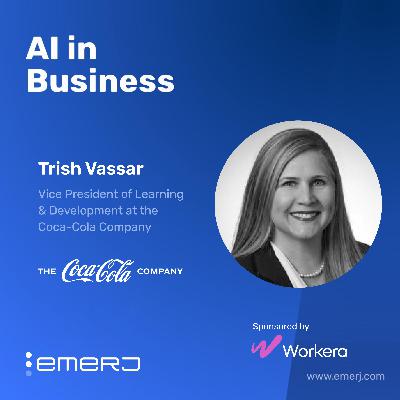

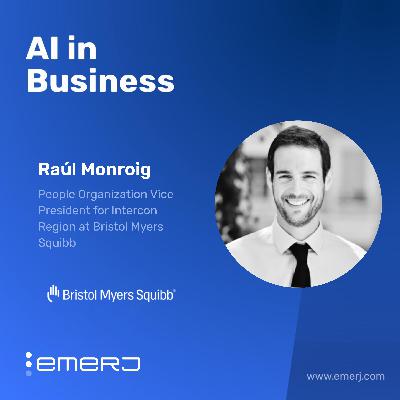




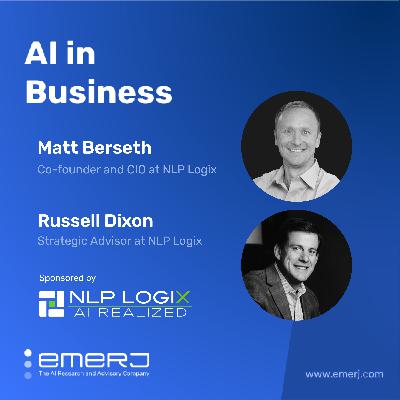

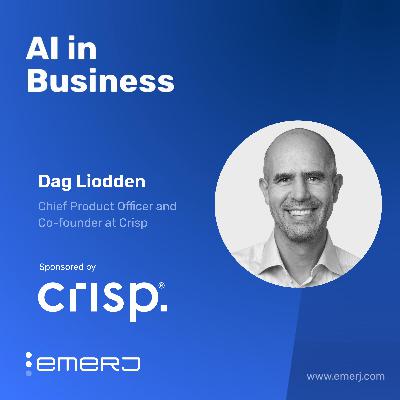
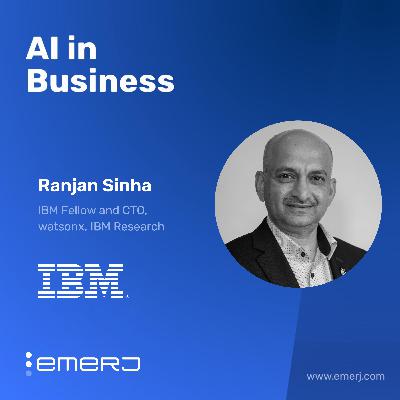




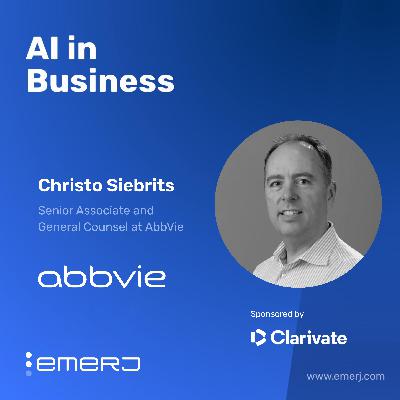


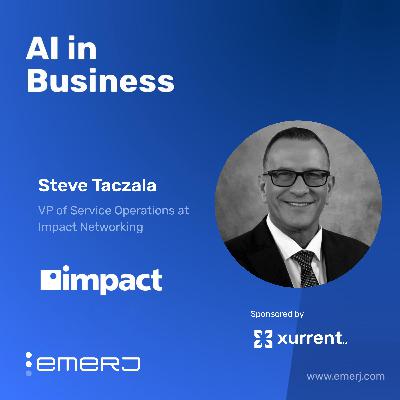




Highlighting real-world use cases from Fortune 2000 firms and startups ensures listeners get https://promptswaale.online/ practical insights, not just theory.
Highlighting real-world use cases from Fortune 2000 firms and startups ensures listeners get https://promptswaale.online/ practical insights, not just theory.
AI cold calling agent software automates outreach by using advanced AI to engage prospects in natural, human-like conversations. It qualifies leads, answers queries, and schedules appointments efficiently, reducing the need for manual calling. Businesses save time, increase conversions, and maintain consistent follow-ups with scalable, 24/7 calling capabilities: https://digibharata.com/best-ai-cold-calling-agent/ #digibharata #ai
The AI in Business Podcast is such a valuable resource for leaders looking to uncover practical AI applications and drive ROI. For businesses inspired by these insights, leveraging an AI automation marketplace like Jasify can help implement AI-driven solutions across workflows, marketing, and operations—turning strategy into measurable results efficiently.
The AI in Business Podcast is such a valuable resource for leaders looking to uncover practical AI applications and drive ROI. For businesses inspired by these insights, leveraging an AI automation marketplace like Jasify can help implement AI-driven solutions across workflows, marketing, and operations—turning strategy into measurable results efficiently.
🔴💚Really Amazing ️You Can Try This💚WATCH💚ᗪOᗯᑎᒪOᗩᗪ👉https://co.fastmovies.org
🔴WATCH>>ᗪOᗯᑎᒪOᗩᗪ>>👉https://co.fastmovies.org
Same goes for me. After a thorough hunt, I landed on AImReply. I’ve been using it for a few months, and I have to say it’s the best AI service https://aimreply.com/ for what you’re looking for. Give them a shot
Are you looking for it to just write the text, or do you want it to specifically manage responses, new drafts, etc.
Something’s telling me there has to be a faster way to handle emails. Do you guys think there’s an AI tool out there that can help me write my emails?
The algorithm, using the data, solves a certain problem, in the process of learning it learns to find patterns in this data and automatically process them. This is already making a huge contribution to various areas of our life, I advise you to learn more about it here https://aisuperior.com/technology/computer-vision-and-image-analysis/
nice episode, was good to hear the insights of American Express
Nikhil is awesome
good
Congratulations to Dan on his patience in this episode, with a completely uncooperative guest. Not worth the time.
awesome podcast.
very good